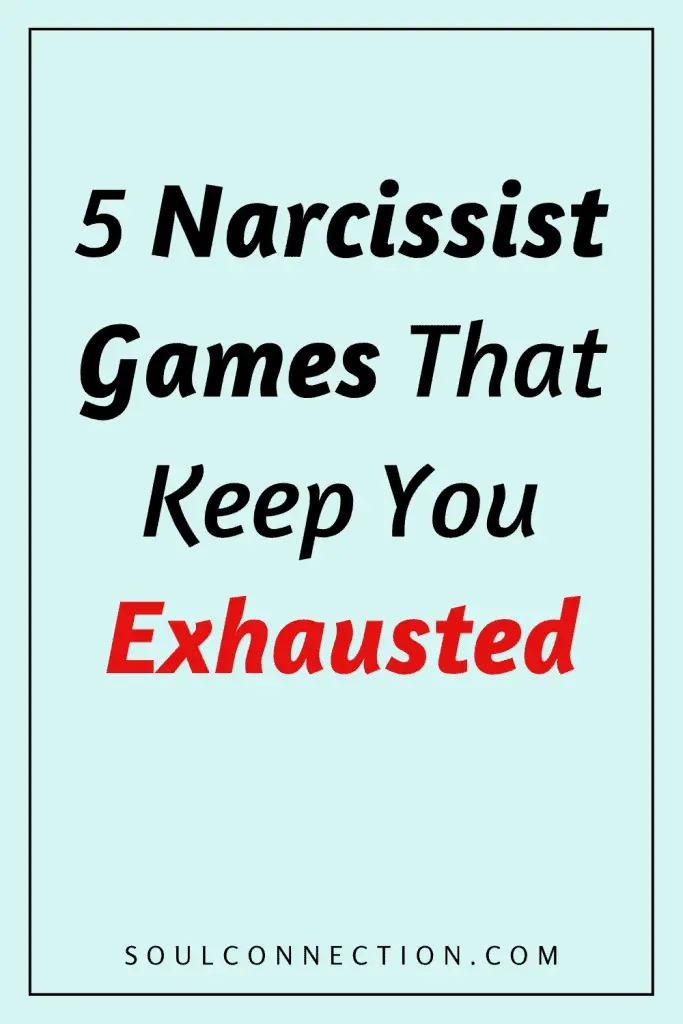Narcissists. If only they put as much effort into being decent as they do into mind games, we’d all be a lot better rested—and, dare I say, less likely to lose our tempers at the supermarket self-checkout.
If you’ve been getting the sneaking suspicion that your relationship feels like a never-ending obstacle course designed by someone with a PhD in manipulation, congratulations: You may be dealing with a narcissist.
Let’s unmask the top five games they love to play (and yes, each one comes with a matching headache).
1. Gaslighting Until You Doubt Reality
Ever found yourself apologizing for things you’re pretty sure you didn’t do? Or spent an hour questioning whether you actually did move their keys, or perhaps time-traveled and forgot? Classic gaslighting.
For narcissists, reality is a flexible concept, and they’re the only ones with editing rights. They’ll question your memory, twist your words, or outright deny something they did five minutes ago (even if there’s CCTV footage and three witnesses).
It’s not just forgetfulness; it’s a deliberate ploy to make you doubt your own mind.
Why does this one leave you so exhausted? Because fighting for your own sanity is a full-time job, and the pay is rubbish.
What helps: Keep a private record of events—texts, emails, even a written journal. Not only will this help you spot the patterns, but it might also be the lifeline you need when you start second-guessing yourself for the 37th time this week.
And when you catch them in a lie? Don’t bother arguing. State the facts, then move on. There’s no winning a debate with someone who thinks facts are optional.
2. The Never-Ending Blame Game
If there’s a problem, it’s your fault. If there isn’t a problem, give it a minute; they’ll create one—and, you guessed it, that’ll also be your fault.
Narcissists are allergic to accountability. They’ll blame you for their bad moods, their missed appointments, or even the weather (yes, really).
Messed up their own work project? Clearly, it’s because you distracted them this morning by—oh, I don’t know—breathing.
This constant finger-pointing isn’t just aggravating; it chips away at your confidence. After all, if you’re always the reason everything goes wrong, maybe you are the problem… right? (Spoiler: You’re not.)
What helps: Start noticing the cycle. When you feel the blame being shoved your way, pause and ask yourself, “Is this really on me?” Setting boundaries around what you will (and won’t) own up to can save your sanity.
And if necessary, leave them to argue with their own reflection for once.
3. The Silent Treatment Olympics
Nothing says ‘mature communication’ like someone refusing to speak to you for three days because you dared to suggest Thai food over pizza.
The silent treatment is a narcissist’s go-to punishment. It’s designed to make you feel anxious, desperate for their attention, and willing to apologize for things you didn’t do just to break the silence.
It’s less about problem-solving and more about control.
This special brand of emotional freeze-out can leave you feeling like you’re trudging through a never-ending winter, with only the hope of eventual thaw if you grovel enough. Charming.
What helps: Resist the urge to chase them or beg for a response. Give them the same energy back (read: go about your day, maybe treat yourself to that Thai food anyway).
Recognize that their silence is about power, not about you deserving punishment. Self-validation is your electric blanket here.
4. Love-Bombing, Then Withdrawing Affection
Narcissists don’t just turn on the charm; they detonate it. One minute you’re being showered with attention, grand gestures, and possibly a few too many heart emojis. Blink, and suddenly you’re staring at a wall of cold indifference.
This cycle of idealization followed by devaluation is emotionally dizzying. The highs are so high that the lows feel devastating.
You start to wonder what you did to lose their affection, and—yep—you’ll do almost anything to get back in their good graces.
It’s not love; it’s a carrot-and-stick routine. The goal? Keep you off-balance, always trying to earn back warmth they withhold at will.
What helps: Spot the pattern. Genuine relationships aren’t all fireworks and famine. When the emotional climate goes from tropical to tundra overnight, remind yourself: This isn’t about your worthiness, it’s about their need for control.
Don’t scramble for their approval. Focus on self-soothing and connecting with people who aren’t using affection like a rewards card.
5. Moving the Goalposts
Ever felt like no matter how much you do, it’s never quite enough? Narcissists are experts at changing the rules mid-game. You meet one expectation (finally!), and—whoops—ten more spring up out of nowhere.
This keeps you chasing their approval, hoping that if you just try harder, you’ll finally get that mythical gold star. Spoiler: The gold star is imaginary, and the finish line keeps moving.
Here’s why it’s so draining: You’re set up to fail, then blamed for not being “good enough.” It’s exhausting, demoralizing, and can leave you feeling like a shell of your former self.
What helps: Set crystal-clear boundaries around what you will do, and stick to them. When the rules change, calmly point it out and refuse to play along.
No one ever wins a game where the ref is also the opposing team’s captain (and makes up the rules as they go).
Finding Your Way Out of the Games
If your relationship feels like an endless round of psychological Whac-A-Mole, you’re not losing your mind—someone’s just making a sport out of it.
Small steps make a big difference: Start by recognizing the patterns. Trust your gut, not their script. Lean on trusted friends who see the real you, not the version your partner paints.
And, if it feels safe, consider talking to a therapist who can help you untangle the emotional knots these games create.
You deserve a relationship where love isn’t a game of hide-and-seek, and your emotional well-being isn’t up for negotiation.
Tired of the games? Good. You were never meant to be anyone’s pawn anyway.


